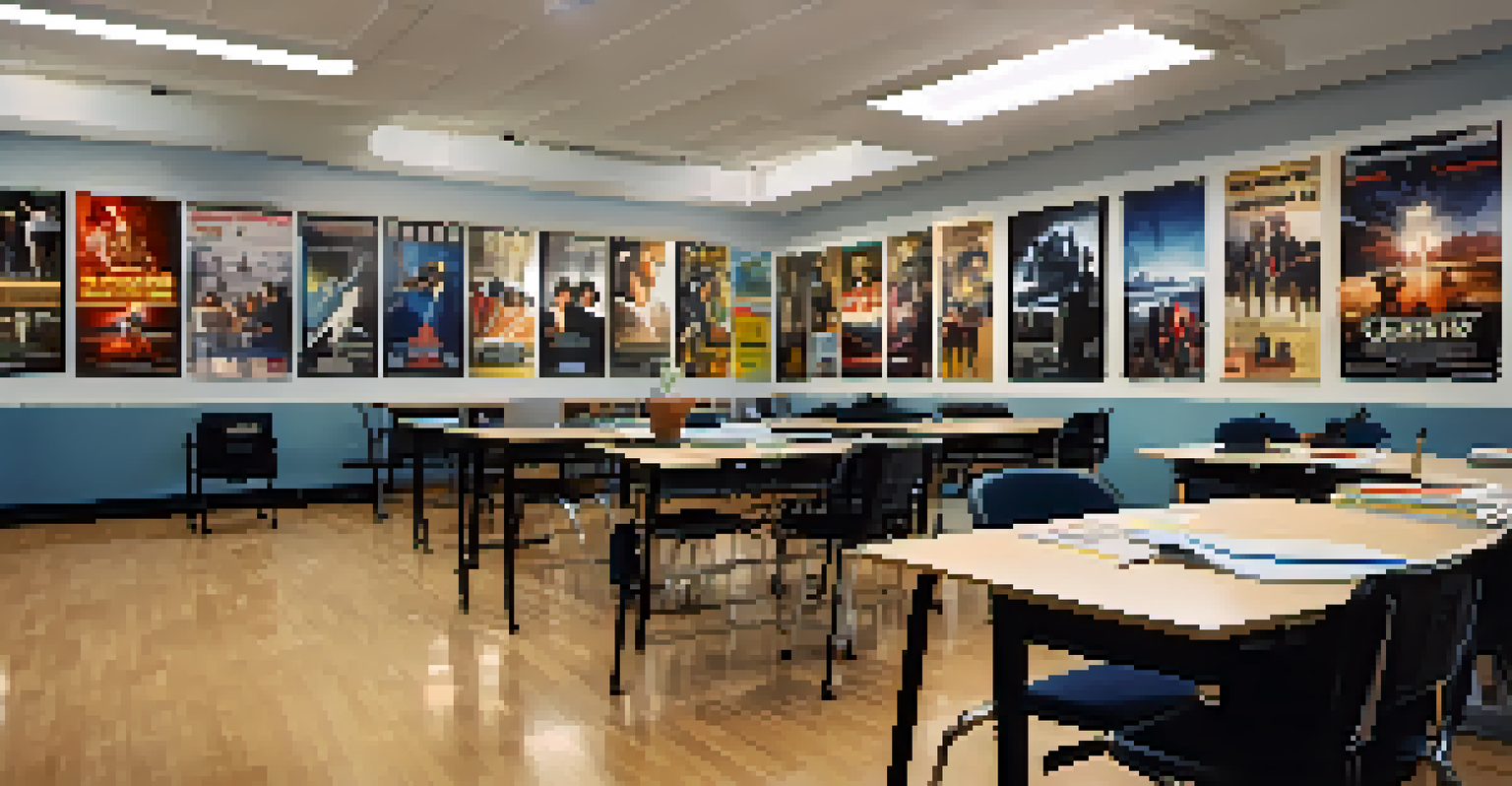Atlanta's Film Schools: Training the Next Generation of Talent

Atlanta's Growing Reputation as a Film Hub
Atlanta has emerged as a vibrant hub for the film industry, attracting filmmakers from all over the globe. With its diverse landscapes and rich history, the city offers a unique backdrop for various film genres. This growth has led to an increased demand for skilled professionals, making film schools in Atlanta more vital than ever.
Filmmaking is a chance to live many lifetimes.
As productions like 'The Walking Dead' and Marvel films have set up shop in the city, local film schools have seen a surge in interest. Aspiring filmmakers are eager to learn the craft in a place buzzing with opportunities. By immersing themselves in Atlanta's thriving film scene, students gain invaluable insights and connections.
Moreover, Atlanta’s supportive community, including the Georgia Film Office, provides incentives for filmmakers, further solidifying its status. This environment not only nurtures talent but also encourages collaboration and innovation among students and professionals alike.
Top Film Schools in Atlanta: A Closer Look
Atlanta boasts several esteemed film schools, each offering unique programs tailored to different aspects of filmmaking. The Georgia State University School of Film, Media & Theatre provides a comprehensive curriculum that covers everything from screenwriting to production. Meanwhile, the Atlanta Film School emphasizes hands-on experience, allowing students to work on real projects.

Another notable institution is Emory University's Film Studies program, which combines critical theory with practical skills. Students here explore the history and cultural impact of cinema while developing their artistic voice. With such diverse options, aspiring filmmakers can choose a school that best aligns with their career goals.
Atlanta: A Film Industry Hub
Atlanta's diverse landscapes and supportive community have positioned it as a thriving center for filmmakers, attracting talent and production opportunities.
Additionally, these schools often collaborate with local film festivals, providing students greater exposure to the industry. This connection helps students build their portfolios and network with established filmmakers, paving the way for future success.
Hands-On Learning: The Key to Success
In the fast-paced world of filmmaking, hands-on experience is crucial. Atlanta's film schools emphasize practical training through workshops, internships, and collaborative projects. Students often work on short films, documentaries, and even feature-length projects, allowing them to apply their classroom knowledge in real-world scenarios.
The best way to predict the future is to invent it.
This experiential learning approach not only hones technical skills but also fosters teamwork and problem-solving abilities. Aspiring filmmakers learn to navigate challenges and adapt to the ever-evolving demands of the industry. Such experiences are invaluable, as they prepare students for the dynamic nature of filmmaking.
Moreover, many schools invite industry professionals as guest lecturers or mentors. This direct interaction helps students gain insights into the industry and learn about current trends. Such guidance can be instrumental in shaping their careers and enhancing their creative visions.
Networking Opportunities: Building Connections
Networking is a critical aspect of launching a successful career in film, and Atlanta’s film schools facilitate this process. Many schools host events, screenings, and workshops where students can meet industry professionals. These gatherings provide an excellent platform for students to showcase their work and make valuable connections.
Additionally, local film festivals, such as the Atlanta Film Festival, often collaborate with film schools to offer students a chance to participate. By volunteering or submitting their projects, students can gain exposure and receive feedback from experienced filmmakers. This involvement enhances their resumes and builds their confidence.
Hands-On Learning is Essential
Film schools in Atlanta prioritize practical training, enabling students to gain real-world experience that prepares them for the dynamic film industry.
Furthermore, alumni networks play a significant role in nurturing future talent. Successful graduates often return to mentor current students, providing them with guidance and opening doors to job opportunities. This sense of community fosters a supportive environment for aspiring filmmakers in Atlanta.
Diverse Programs: Catering to Various Interests
Atlanta’s film schools offer diverse programs that cater to a wide range of interests within the film industry. From screenwriting and directing to cinematography and editing, students can find specific tracks that match their passions. This variety ensures that every aspiring filmmaker can cultivate their unique talents and skills.
Some schools even provide specialized workshops focused on emerging technologies like virtual reality and drone filmmaking. By staying ahead of the curve, these programs equip students with the knowledge needed to thrive in a rapidly changing industry. This adaptability is crucial as filmmakers seek innovative ways to tell their stories.
Moreover, the emphasis on diversity in storytelling allows students to explore different cultural perspectives through their work. Schools encourage students to bring their unique experiences to the forefront, enriching the narratives they create and promoting inclusivity in filmmaking.
The Role of Technology in Film Education
Technology plays a pivotal role in modern filmmaking, and Atlanta's film schools are embracing this change. With state-of-the-art facilities and equipment, students have access to the latest tools used in the industry. This hands-on experience with technology helps them become proficient in various aspects of production.
In addition to traditional filmmaking techniques, schools are incorporating digital media and online platforms into their curricula. Students learn how to navigate social media marketing, video editing software, and distribution channels, which are essential in today’s digital landscape. This comprehensive training prepares them for the multifaceted nature of contemporary filmmaking.
Networking Fuels Career Growth
Networking opportunities provided by local film schools and festivals help aspiring filmmakers build valuable connections that can enhance their career prospects.
Furthermore, schools often collaborate with tech companies to provide students with workshops on emerging technologies. This exposure ensures that graduates are not only skilled in traditional filmmaking but also equipped to tackle new challenges and embrace innovation in their creative endeavors.
The Future of Film Education in Atlanta
As the film industry continues to flourish in Atlanta, the future of film education looks promising. Local schools are expanding their programs and enhancing their facilities to meet the growing demand for skilled professionals. This evolution ensures that students receive a top-notch education that reflects industry standards.
Moreover, the increasing emphasis on inclusivity and diverse storytelling is shaping the curriculum at these institutions. Schools are actively seeking to diversify their student bodies and faculty, fostering a rich environment for creativity and collaboration. This commitment to inclusivity helps prepare students to tell stories that resonate with a global audience.

Ultimately, as Atlanta cements its place as a leading film hub, the film schools within the city will continue to play a vital role in nurturing the next generation of talent. With a focus on hands-on learning, networking opportunities, and technological advancements, these schools are setting the stage for future filmmakers to thrive.